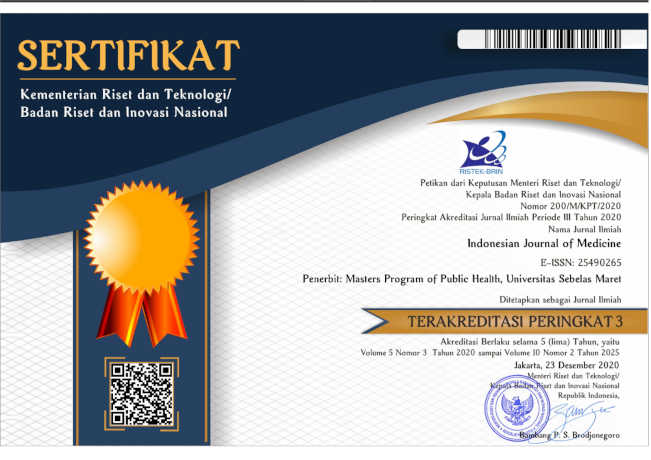Effect of Early Spironolactone on the ST2 Level and Clinical Changes in Acute Decompensated Heart Failure Patients
DOI:
https://doi.org/10.26911/theijmed.2019.4.3.198Abstract
Background: In spite ofmajor advances in therapy, morbidity, and mortality due to acute decompensated heart failure (ADHF) remain poor. Early initiation of mineralocorticoid antagonist (spironolactone) may increase the suppression of negative effect of renin-angiotensin-aldosterone system (RAAS) activation, even though it already uses ACEI/ARB accompanying ADHF and give a better outcome. This study aims to determine the effect of early spironolactone 100 mg a day for 3 consecutive days on the suppression of tumorigenicity 2 (ST2) level and clinical changes in patients with ADHF.
Subjects and Method: This was a randomized single blind controlled trial. Thirty eight consecutive patients with ADHF hospitalized at Dr. Moewardi Hospital, Surakarta were randomized into two groups: spironolactone group (standard therapy plus spironolactone 100 mg per day for 3 day, n=19) and control group (standard therapy, n=19). Clinical sign and simptom of ADHF was monitored everyday and the difference of clinical changes was evaluated at the day-3. Venous blood samples were collected from all patients at the first day prior therapy and day-4 after therapy. The dependent variable was ST2 level. The independent variable wasSpironolacton therapy. The data were analyzed by independent t-test.
Results: Decreased levels of ST2 in the spironolactone group (mean= 36.96; SD= 21.29) was higher than the control group (mean= 19.73; SD= 16.48) and it was statistically significant (p= 0.008). Spironolacton therapy 100 mg once daily at the first 3 day in patient with ADHF was safe, no hiperkalemia, or worsening renal function. There was decreasing risk of hipokalemia up to 33% (RR= 0.33; 95% CI= 0.1 to 1.0; p= 0.036) and greater proportion patient with improvement clinical simptom and sign of ADHF at day-3 in the spironolactone group vs control group.
Conclusion: Administration of spironolactone 100 mg at the first 3 day plus standard therapy decreases levels of ST2, safe, decreases risk of hipokalemia and give greater proportion of clinical improvement patients ADHF.
Keywords: Spironolactone, ADHF, ST2
Correspondence: Trisulo Wasyanto. Department of Cardiology and Vascular Medicine, Faculty of Medicine, Universitas Sebelas Maret/Dr. Moewardi Hospital. Jl. Kol. Sutarto 132, Surakarta 57126. Indonesia. Email: trisulo.wasyanto@gmail.com.
Indonesian Journal of Medicine (2019), 4(3): 232-240
https://doi.org/10.26911/theijmed.2019.04.03.06
References
Albaghdadi M, Gheorghiade M, Pitt B (2011). Mineralocorticoid receptor antagonism: therapeutic potential in acute heart failure syndromes. Eur Heart J. 32: 2626-33.
Badan Penelitian dan Pengembangan Kesehatan Departemen Kesehatan Republik Indonesia (2013). Laporan Nasional Riset Kesehatan Dasar (Riskesdas) Jakarta: Departemen Kesehatan Republik Indonesia.
Bhardwaj A, Januzzi JL (2010). ST2: A novel biomarker for heart failure. Expert Rev Mol Diagn. 10: 459–64.
Borghi C, Boschi S, Ambrosioni E et al. (1993). Evidence of a partial escape of renin-angiotensin-aldosterone block-ade in patients with acute myocardial infarction treated with ACE inhibitors. J Clin Pharmacol. 33: 40-5.
Burger AJ (2005). A Review of the Renal and Neurohormonal Effect of B-Type Natriuretic Peptide. CHF. 11:30-8.
Dieplinger B, Januzzi JL, Steinmeir M et al. (2009). Analytical and clinical evaluation of novel high-sensitivity assay for measurement of soluble ST2 in human plasma-the Presage ST2 assay. Clin Chim Acta. 409: 33-40.
Domanski M, Norman J, Pitt B, et al. (2003). Diuretic use, progressive heart failure, and death in patients in the Studies of Left Ventricular Dysfunction (SOLVD). J Am Coll Cardiol. 42: 705–8.
Ferreira JP, Santos M, Almeida S, et al. (2014). Mineralocorticoid receptor antagonism in acutely decompensated chronic heart failure. Eur J Intern Med. 25: 67-72.
Gheorghiade M, Pang PS (2009). Acute heart failure syndrome. J Am Coll Cardiol. 3: 557-73.
Hasselblad V, Stough WG, Shah MR, et al. (2007). Relation between dose of loop diuretics and outcomes in a heart failure population: results of the ESCAPE trial. Eur J Heart Fail. 9: 1064–9.
Jessup M, Brozena S (2013). Heart failure. N Engl J Med. 348:2007-18.
Kakkar L, Lee RT (2008). The IL-33/ST2 pathway: therapeutic target and novel biomarker. Nat Rev Drug Disc. 7(10): 827-40.
Lax A, Sanchez-Mas J, Lopez AM, et al. (2015). Mineralocorticoid Receptor Antagonists Modulate Galectin-3 and Interleukin-33/ST2 Signaling in Left Ventricular Systolic Dysfunction After Acute Myocardial Infarction. J Am Coll Cardiol HF. 3:50-8.
Levy D, Kenchaiah S, Larson MG, et al. (2002). Long-term trends in the incidence of and survival with heart failure. N Eng J Med. 347:1397-402.
Maisel A, Xue Y, Van Veldhuisen DJ, et al. (2014). Effect of spironolactone on 30-day death and heart failure re-hospitalization (from the COACH Study). Am J Cardiol; 114:737-42.
Roger VL, Weston SA, Redfield MM, et al. (2004). Trends in heart failure incidence and survival in a community-based population. JAMA. 292:344-50.
Sabatine MS, Morrow DA, Higgins LJ, et al. (2008). Complementary roles for bio-markers of biomechanical strain ST2 and N-terminal prohormone B-type natriuretic peptide in patients with ST-elevation myocardial infarction. Circulation; 117:1936-44.
Sanjay S, Annigeri RA, Seshadri R, et al. (2008). The comparison of the diu-retic and natriuretic efficacy of con-tinuous and bolus intravenous furo-semide in patient with chronic kidney disease. Nephrology. 13 (3): 247-50.
Struthers A, Krum H, Williams G (2008). A comparison of the aldosterone blocking agent’s epleronone and spironolactone. Clin Cardiol. 31: 153-8.
Struthers A (2002). Aldosterone: cardiovascular assault. Am Heart J. 144 (5): S2-7.
Trullas JC, Morales-Rull Jl and Formiga F. 2014. Diuretic therapy in acute heart failure. Med Clin. 42(1): 36-41











